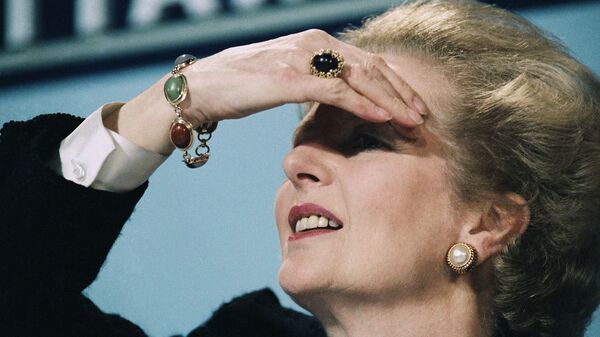With a majority of 78 seats in Parliament, the Conservative Party has achieved a landslide victory in perhaps the most defining post-war general election.
Jeremy Corbyn failed to mobilise Remain-supporting voters, so the way is now clear for Boris Johnson to deliver Brexit, his cherished dream of the past three years.
The Tories have won 364 out of 650 seats and 43.6 percent of the vote – the last time they had so much control in Westminster was in 1987. And while the political climate in the UK has changed a lot since then, both races have some intriguing similarities.
For Margaret Thatcher, the 1987 race would become a record third consecutive victory. Her party lost only 21 seats in Parliament (following her historic win in 1983) and retained a majority in Parliament with 376 seats and 42.2 percent of the vote.
Thatcherite economy in 1987
Thatcher campaigned off the back of the Lawson Boom, named so after her Chancellor of the Exchequer Nigel Lawson. Her neoconservative policy, similar to that of Ronald Reagan, focused on reducing the tax burden and public spending (and government regulation altogether), as well as curbing the money supply in order to reduce inflation. Defence policy was a top priority for her government too.
The second half of the 1980s in Britain was marked by strong economic growth and a consumer boom, coupled with a dramatic fall in unemployment and consistently low inflation rates. The Tory campaign in 1987 sought to capitalise on those strides and focused on lower taxes and strong defence, while attacking Labour for its proposed income tax hikes.
Following criticism from Nigel Lawson, then-Shadow Chief Secretary to the Treasury Bryan Gould was forced to admit that Labour’s tax plan would hit the top 5 percent of British earners.
Johnson’s and Corbyn’s tax plans
This resembles the dispute around taxes that happened prior to Thursday’s election. Boris Johnson promised to announce a “tax-cutting budget” in his first 100 days as prime minister, while Corbyn's economic proposals included raising taxes on both companies and individuals to fund his day-to-day spending commitments.
Corbyn pledged that, when in government, he would apply the additional income tax rate of 45 percent for earnings over £80,000 a year (the top 5 percent of earners), and a 50% rate on income starting at £125,000 a year.
Internal opposition
By 1987, Thatcher’s cabinet had successfully overcome two long and divisive industrial strikes, one by miners in 1984-1985 and another by print workers in 1985-1986. Her government faced a greater threat in 1986, when two senior ministers, Leon Brittan and Michael Heseltine, resigned over the Westland affair, an argument over the future of Britain’s last remaining helicopter manufacturer.
The scandal seemed so serious that shortly after Brittan and Heseltine presented their resignations, Thatcher reportedly said on 27 January 1986, “I may not be Prime Minister by six o’clock tonight.”
Johnson’s four-month premiership hasn’t been without its internal feuds. His own brother, MP Jo Johnson, quit as an MP and minister in a Shakespearean twist in early September over differences with the PM.
In an open revolt days prior to that, 21 Conservative MPs backed the opposition’s move to prevent a no-deal Brexit. All of them were expelled and continued to sit as independents, although 10 of them had their whip reinstated later on.
Poor standing in Scotland
Both Thatcher in 1987 and Johnson in 2019 produced weak results in Scotland, albeit for different reasons. Under Thatcher, the output of the manufacturing sector began to drop as the country moved toward the post-industrial economy. By 1987, Scotland had lost nearly a third of its manufacturing base, while unemployment raged. Many attributed that industrial decline to the Prime Minister.
Boris Johnson isn’t the most likeable person in Scotland for two reasons. First, he has definitely ruled out a second independence vote. Second, the majority of Scots are against Brexit (62 percent voted Remain in 2016). The SNP argued that with Johnson in power, they would be taken out of the EU against their will. Now, this fear is as justified as ever.
Take on EU
A feature of Thatcher’s premiership that often goes unnoticed is her coldness toward what is now European Union. Though initially friendly toward European integration, the prime minister gradually grew hostile to it.
In 1984, she successfully negotiated the UK Rebate, a mechanism that in effect lowers Britain’s contribution to the European budget. After 1987, she fought to reform the European communities to avoid what she called “a European super-state exercising a new dominance from Brussels” – sparking opposition in her own party that eventually led to her downfall.
Boris Johnson’s attitude to the European Union is well-documented. Brexit, of which Johnson is the leading proponent, dominated the agenda of Thursday’s election and it seems that the Tory’s resounding victory is partly due to Corbyn’s failure to present a coherent plan on the issue.
There is one key similarity between the two elections. One of Thatcher’s campaign slogans in 1987 was “Britain is great again. Don’t let Labour wreck it”. The Tory message, although not articulated in slogans, means exactly the same.
But there is also one key difference. After two terms at No.10, Thatcher was more about defending past achievements. Johnson wants to change the future.


